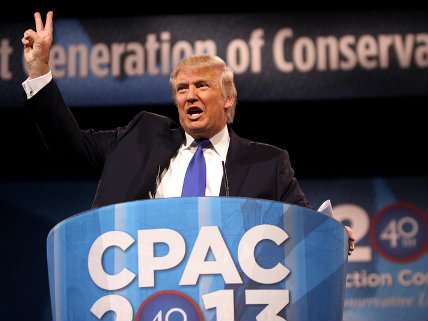New Poll Finds That GOP Voters are Out of Their Minds

Is Donald Trump electable? A sizable majority of Republicans seem to think the answer is yes.
A new poll suggests that more Republican-leaning voters believe he is capable of winning a general election next year than any other candidate. About 70 percent of Republicans say he's a potential victor in November 2016, more than any other GOP candidate. Trailing Trump are neurosurgeon Ben Carson and former Florida governor Jeb Bush, both of whom are ranked as plausible winners next year by about 60 percent of GOP voters.
The idea that Trump and Carson are good bets in a general election is, as the Associated Press notes, not exactly conventional wisdom amongst the party's professional class. In fact, the opposite is true. Trump and Carson are considered the least electable candidates in the GOP field.
It's yet another sign that GOP voters are warming to trump. As recently as June, just 20 percent of Republican voters viewed Trump favorably, a figure that more recently has grown past 50 percent.
As is increasingly the case with news related to Trump, this reveals at least as much about the state of the Republican party as it does about Trump himself.
The most obvious takeaway here is that there is a massive split between people who describe themselves as GOP voters and the Republican professional class.
On the one hand, the party's voting base seems to increasingly think that Trump, who is basically running for president on a combination of sneering nativism and a Twitter-based Triumph the Insult Comic Dog impression, is the sort of candidate who could rally a majority of the country behind him in a general election campaign.
On the other hand are people who are paid to find ways to put Republican politicians into office, who analyze polls, craft messaging, raise and run campaigns for a living. These people, who are, to be sure, sometimes wrong but generally make it their business to be experts on national politics, think there's no possible way that someone as polarizing, as inexperienced, and widely disliked outside of Republican circles could actually win a general election.
Which is another way of saying that they believe that the Republican base has gone totally and utterly bonkers, although they rarely say so in such terms. The gap between party elites and its base, and the various frictions it causes, is one of the most defining features of the Republican party today.
Which brings me to my second point: The Republican base has gone totally and utterly bonkers.
It is extremely difficult to imagine Donald Trump winning a presidential election against a Democratic candidate of any competence. And while Hillary Clinton, who is virtually certain to be the Democratic nominee, has many flaws, a lack of basic political competence and capabilities is not one of them. Indeed, Clinton is almost perfectly positioned to exploit Trump's large and obvious weaknesses in a general election, with women, with Hispanics, with the portion of the electorate that has not gone all in for Trump-mania, and is not willing to put up with it in any form. The 70 percent of Republicans who say that Trump could win the presidency next year seem to have mistaken their own preferences for the preferences of the public at large. The two are not the same.
And that brings me to my final point, which is that Trump's success reveals not only the gaps between the GOP base and the party elite, but between the GOP base and the rest of the country. For his fans in the GOP base, Trump an outsider-savior who might be able to cut through the awfulness of national politics and make drastic changes. For others, he comes across as an inexperienced reality show buffoon. Yes, a party's base often views its candidates differently than the nation at large, but the disagreement over Trump seems pointedly different to me: It is not the same as the disagreements over candidates like Mitt Romney, or John McCain, or John Kerry, or Al Gore, or Bob Dole. While many people were deeply hostile to all of those candidates, most people recognized that each had a degree of legitimate political experience and were, in a broad sense, essentially qualified to be president. The same cannot be said with Donald Trump
Trump still may not win the GOP nomination, but his sustained success this election (and, to a lesser extent, the related success his Trump's current Iowa nemesis, neurosurgeon Ben Carson) reflects all too clearly on the state of the contemporary GOP. It is not very concerned with conservatism or with policy at all, save for vague anti-immigration fantasies; it is attracted to bullying, often intentionally offensive rhetoric and politicians who promise what is obviously impossible; and it is not only frustrated with the political process but almost entirely detached from it, to the point where the party base is alienated even from its own professional class. At this point, Trump is best viewed as a sort of human encapsulation of the Republican party's problems, an encapsulation of its ailments and neuroses—the avatar of its increasingly dominant id.


Show Comments (364)